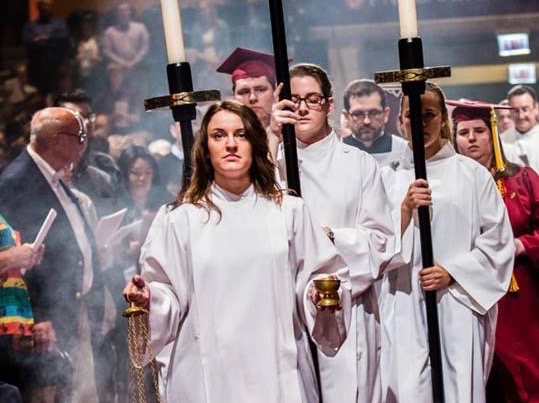
Lizzie Sextro (first in procession) serving as an acolyte
My favorite liturgical ministry is serving as an acolyte. For those familiar with this role, an acolyte in the Catholic church assists the priest with liturgical tasks during the celebration of the Mass. You can usually find us wearing long, white robes called albs.
Ever since I was trained as an acolyte in the 6th grade, I have felt humbled by my experiences in serving alongside the priest. I can recall numerous times when my face has burnt red with embarrassment because I forgot to place a chalice on the altar or to bring up the book for the closing prayers.
Nevertheless, I have learned many things in my journey as an acolyte, and I have found it to be an incredibly life-giving and continuously humbling ministry.
I am reminded lately of the humility I learned from my acolyte ministry because I have been reflecting on the role of church leaders in the lives of LGBTQ people.
I often find myself being incredibly disappointed and saddened by how priests and ministers do not take time to listen to LGBTQ folk. My LGBTQ friends have told me about "bad confession" experiences with insensitive priests, or how they are afraid to come out in certain spaces, or that they are frustrated by the heteronormative language used in homilies. Many of my friends are increasingly nervous about finding or keeping a job in the Catholic church in the wake of the firing of so many LGBTQ Catholics for getting married to their partners.
Despite these injustices, I stand firm in the fact that our church is simply called to be better than this. I stand hopeful that we can enact change.
My suggestion is that we ought to strive for a church that acts more like an acolyte: a humble church. Catholics have such a rich understanding that the church is a guiding and transforming force in people's lives through the Holy Spirit's movement in the world. My question is: How can the church continue its work while also taking on a stance of humility?
Now, even if you think the metaphor of the church-as-acolyte is a bit of a stretch, stick with me. I think we can find three valuable connections here.
First, I mentioned that my own experience as an acolyte makes me feel humbled. To this day, I still make mistakes on the altar — even after more than a decade. Making mistakes is okay because we learn from them. Similarly, we ought to recognize the fallibility of the church. A humble church needs to recognize its own mistakes, especially in the way it hurts people in the LGBTQ community. The humble church can learn from its mistakes.
In a theology class last year, I remember voicing a particular frustration about the church during a unit on ecclesiology, the study of church structures and governance. I said to my professor, "How can this church be the so-called 'sacrament of salvation' when it constantly hurts people?" My professor replied, "If you are looking for a perfect church in this lifetime, I guarantee you won't find it."
A humble church makes mistakes and recognizes those mistakes and apologizes for those mistakes. Pope Francis has suggested that the church apologize to LGBT people (among others), but so far hardly any leaders have followed his directive.
Advertisement
Second, as an acolyte, one is forced to pay full attention during the Mass and to listen and watch every move that happens. If something goes wrong, an acolyte identifies it and does her best to troubleshoot. The role of a humble church as a listening church could be a way to learn and know more about same-sex marriages and LGBTQ families.
We need to start recognizing the same-sex couple as a privileged site of God's revelation. If we start there, new conversations can abound through more attention to the consciences of LGBTQ couples and their lived experiences as Catholics.
A humble church listens to its members and trusts their experiences.
Finally, an acolyte guides the processions at the beginning and the end of Mass. She gets everyone down the aisle to Jesus' body and blood at the altar, and she gets everyone to the exits where we are called to "go and proclaim the Gospel."
Similarly, a humble church can still be a guiding church, as long as its guidance maintains an openness to dialogue with those it is guiding. This is an absolute necessity, so that the church, which is meant to guide us to our ultimate concern of Jesus Christ, does not turn into a church whose leaders seek power-hungry control. The church is called to be a pastor, not a scorekeeper.
A humble church should guide with a willingness to be guided by the faithful.
It is a common trope in the Catholic church that the church acts as the "bride of Christ." This is a tired metaphor, and a heteronormative one at that. If the church is to take seriously the pain and concerns of its LGBTQ members, perhaps it should become more like an "acolyte of Christ" in an attempt to transform into a humble church.
[This blog is reprinted with permission from Bondings 2.0, the daily blog of New Ways Ministry, where Lizzie Sextro is a regular contributor. Sextro is a theology graduate student at Boston College School of Theology and Ministry.]







